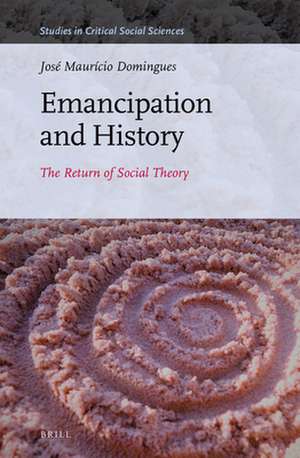Emancipation and History: The Return of Social Theory: Studies in Critical Social Sciences, cartea 114
Autor José Maurício Dominguesen Limba Engleză Hardback – 20 sep 2017
Din seria Studies in Critical Social Sciences
-
 Preț: 257.21 lei
Preț: 257.21 lei -
 Preț: 230.50 lei
Preț: 230.50 lei -
 Preț: 258.43 lei
Preț: 258.43 lei -
 Preț: 215.12 lei
Preț: 215.12 lei -
 Preț: 214.03 lei
Preț: 214.03 lei -
 Preț: 216.32 lei
Preț: 216.32 lei -
 Preț: 214.79 lei
Preț: 214.79 lei -
 Preț: 214.59 lei
Preț: 214.59 lei -
 Preț: 269.42 lei
Preț: 269.42 lei -
 Preț: 214.86 lei
Preț: 214.86 lei -
 Preț: 85.13 lei
Preț: 85.13 lei -
 Preț: 178.51 lei
Preț: 178.51 lei -
 Preț: 215.20 lei
Preț: 215.20 lei -
 Preț: 257.49 lei
Preț: 257.49 lei -
 Preț: 257.17 lei
Preț: 257.17 lei -
 Preț: 214.33 lei
Preț: 214.33 lei -
 Preț: 150.65 lei
Preț: 150.65 lei - 18%
 Preț: 870.64 lei
Preț: 870.64 lei - 23%
 Preț: 1132.55 lei
Preț: 1132.55 lei - 18%
 Preț: 1091.44 lei
Preț: 1091.44 lei - 18%
 Preț: 712.03 lei
Preț: 712.03 lei - 18%
 Preț: 800.65 lei
Preț: 800.65 lei -
 Preț: 229.94 lei
Preț: 229.94 lei -
 Preț: 390.36 lei
Preț: 390.36 lei -
 Preț: 223.37 lei
Preț: 223.37 lei -
 Preț: 351.11 lei
Preț: 351.11 lei -
 Preț: 226.24 lei
Preț: 226.24 lei -
 Preț: 229.55 lei
Preț: 229.55 lei -
 Preț: 230.71 lei
Preț: 230.71 lei -
 Preț: 268.43 lei
Preț: 268.43 lei -
 Preț: 225.87 lei
Preț: 225.87 lei -
 Preț: 228.59 lei
Preț: 228.59 lei -
 Preț: 226.67 lei
Preț: 226.67 lei -
 Preț: 226.67 lei
Preț: 226.67 lei -
 Preț: 349.55 lei
Preț: 349.55 lei -
 Preț: 228.59 lei
Preț: 228.59 lei -
 Preț: 223.80 lei
Preț: 223.80 lei -
 Preț: 186.78 lei
Preț: 186.78 lei -
 Preț: 226.67 lei
Preț: 226.67 lei -
 Preț: 231.46 lei
Preț: 231.46 lei -
 Preț: 229.55 lei
Preț: 229.55 lei -
 Preț: 231.46 lei
Preț: 231.46 lei -
 Preț: 269.42 lei
Preț: 269.42 lei -
 Preț: 190.70 lei
Preț: 190.70 lei -
 Preț: 273.26 lei
Preț: 273.26 lei -
 Preț: 312.59 lei
Preț: 312.59 lei -
 Preț: 196.41 lei
Preț: 196.41 lei -
 Preț: 269.42 lei
Preț: 269.42 lei -
 Preț: 232.45 lei
Preț: 232.45 lei -
 Preț: 190.65 lei
Preț: 190.65 lei
Preț: 569.80 lei
Preț vechi: 694.88 lei
-18% Nou
Puncte Express: 855
Preț estimativ în valută:
109.03€ • 116.59$ • 90.91£
109.03€ • 116.59$ • 90.91£
Carte indisponibilă temporar
Doresc să fiu notificat când acest titlu va fi disponibil:
Se trimite...
Preluare comenzi: 021 569.72.76
Specificații
ISBN-13: 9789004348752
ISBN-10: 9004348751
Dimensiuni: 155 x 235 mm
Greutate: 0.4 kg
Editura: Brill
Colecția Brill
Seria Studies in Critical Social Sciences
ISBN-10: 9004348751
Dimensiuni: 155 x 235 mm
Greutate: 0.4 kg
Editura: Brill
Colecția Brill
Seria Studies in Critical Social Sciences
Cuprins
Introduction
Chapter 1 – Vicissitudes and possibilities of critical theory today
Defining critical theory
Contemporary modernity
Renewing critique
Chapter 2 – Global modernity: levels of analysis and conceptual strategies
Introduction
Levels of analysis
Descriptions
Middle-range analytical concepts
General analytical concepts
A trend-concept: secularization
Conclusion
Chapter 3 – Existential social questions, developmental trends and modernity
The problem
Existential social questions
Existential questions, developmental trends and modernizing moves
Final words
Chapter 4 – History, sociology and modernity
Introduction
Historical sociology and sociological theory
Theory and mechanisms
Conclusion
Chapter 5 – Realism, trend-concepts and the modern state
Introduction
Beyond empiricism (and critical realism)
The modern state and modern society
Collective subjectivity, mechanisms, modernization
Final words
Chapter 6 – Family, modernization and sociological theory
Two intertwined themes
Globalization and modernization
The family, the “dimensions” of social life and the “existential questions”
Conclusion
Chapter 7 – The basic forms of social interaction
Introduction
Principles of organization, mechanisms of coordination
Principles of antagonism, mechanisms of opposition
Coordination, antagonism
Interactive inclinations
Bases of justification
Conclusion
Chapter 8 – The imaginary and politics in modernity: the trajectory of Peronism
Introduction
Theoretical background
Historical Peronism
The Argentina of Kirchner and Fernández de Kirchner
The imaginary and politics in modernity
Chapter 9 – Critical social theory and developmental trends, emancipation and late communism
Introduction
Capitalism, accumulation and communism
Contemporary alternatives
Tasks of critical theory – or late twentieth century communism
References
Index
Chapter 1 – Vicissitudes and possibilities of critical theory today
Defining critical theory
Contemporary modernity
Renewing critique
Chapter 2 – Global modernity: levels of analysis and conceptual strategies
Introduction
Levels of analysis
Descriptions
Middle-range analytical concepts
General analytical concepts
A trend-concept: secularization
Conclusion
Chapter 3 – Existential social questions, developmental trends and modernity
The problem
Existential social questions
Existential questions, developmental trends and modernizing moves
Final words
Chapter 4 – History, sociology and modernity
Introduction
Historical sociology and sociological theory
Theory and mechanisms
Conclusion
Chapter 5 – Realism, trend-concepts and the modern state
Introduction
Beyond empiricism (and critical realism)
The modern state and modern society
Collective subjectivity, mechanisms, modernization
Final words
Chapter 6 – Family, modernization and sociological theory
Two intertwined themes
Globalization and modernization
The family, the “dimensions” of social life and the “existential questions”
Conclusion
Chapter 7 – The basic forms of social interaction
Introduction
Principles of organization, mechanisms of coordination
Principles of antagonism, mechanisms of opposition
Coordination, antagonism
Interactive inclinations
Bases of justification
Conclusion
Chapter 8 – The imaginary and politics in modernity: the trajectory of Peronism
Introduction
Theoretical background
Historical Peronism
The Argentina of Kirchner and Fernández de Kirchner
The imaginary and politics in modernity
Chapter 9 – Critical social theory and developmental trends, emancipation and late communism
Introduction
Capitalism, accumulation and communism
Contemporary alternatives
Tasks of critical theory – or late twentieth century communism
References
Index
Notă biografică
José Maurício Domingues, PhD in sociology (LSE), professor at IESP-UERJ, Brazil, author of Global Modernity, Development, and Global Civilization (Routledge, 2012), Latin America and Contemporary Modernity (Routledge, 2018), Modernity Reconstructed (University of Wales Press, 2006), Social Creativity, Collective Subjectivity and Contemporary Modernity (Macmillan/Saint Martin's Press, 2000) and Sociological Theory and Collective Subjectivity (MacMillan/Saint Martin's Press, 1995).
